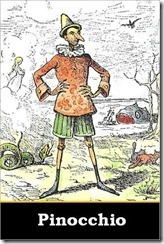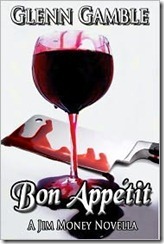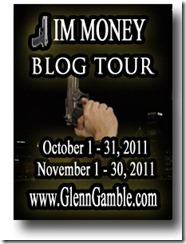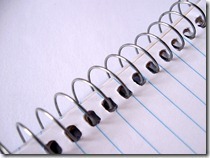Elizabeth Spann Craig's Blog, page 191
October 14, 2011
Scaring Ourselves Silly & Other Writerly Hazards
 by Elizabeth S. Craig @elizabethscraig
by Elizabeth S. Craig @elizabethscraig
I was reading a great psychological thriller on Thursday afternoon. It was broad daylight, 1:30 p.m., the cats were snoozing in a sunbeam, the dog was snoring, and I was convinced that there was an intruder upstairs.
Yes, it was Before I Go to Sleep by S.J. Watson and it scared me silly. But it wasn't just the book. It was my own imagination.
Too imaginative? In fact, for a mystery writer, I scare myself on a pretty regular basis. I remember as a kid I'd get up out of bed all night (lifelong insomniac) and would tell my mother I heard noises or that there were monsters in my room, or that I saw a strange and ominous light moving across my bedroom…and she would tell me it was my imagination.
And darn it, it was!
This isn't the only hazard of being a writer. I find myself in a complete fog much of the day. This comes from thinking about my book throughout the day…driving, running errands. I've been known to look blankly at people who wave at me from cars. I tell people that I'm just very slow to react to faces, but the truth is that I was living in the Neighborhood of Make-Believe, as Mr. Rogers would say.
Changing as a reader,viewer, and filmgoer: It's also, as I mentioned the other day, that I take a very analytical approach to most of my reading and film-going/television watching. Actually, I've just about given up on TV altogether.
Clutter: As much as I do online and as much as I do my writing on computer, I still end up with paper everywhere. Notebooks, index cards, scraps of receipts with scribbled notes on them, Post-Its. My bedside table is full of cryptic scribbles that seem deranged if you read them. At the end of the day, I try to collect all my papers and put them in one place. This is tough.
How have you changed since becoming a writer?
Photo credit: Muffet
October 13, 2011
Lessons from the Car Dealership
by Elizabeth S. Craig @elizabethscraig[image error]
I've had a crazy last week. That's because, in addition to the regular craziness, I had a car kick the bucket on me.
My husband, fortunately, jumped into full car-shopping gear while I tried really hard to stay out of it. My demands of a car are pretty minor: I want it to run and I want it to be safe. Low gas mileage would be nice. That's about it. :)
Unfortunately, though, I couldn't completely stay out of the car shopping. "Elizabeth, you've got to test drive the two cars I've narrowed it down to," said my husband. "This is going to be the car you drive every day. I can't just buy you a car without your ever even driving it!"
"Can't you?" I felt very wistful.
No, he really couldn't. So I ended up at two car dealerships on Monday. My husband told me he'd asked the salesmen not to try to sell me on the cars at all…just to let me drive them.
For salesmen, of course, that's a pretty tall order. And they're just so extroverted. I believe they tried their very hardest not to give me a sales pitch. But I could tell they were gently trying to show the car in the best light possible.
Writers do a lot more selling than most of us would like. Not only are we literally selling our books (promoting them), but we're also trying to keep our readers flipping pages and giving them a great read so we can have them buy our next book.
After listening to the expert salesmen at the dealerships, I realized that some of their techniques could be adapted for our own use, too:
Have a pithy pitch: The salesmen both dropped something casual about what they loved about the car they were showing me. It's good to be prepared for people to ask us, in person, about our book. I used to get a deer-in-the-headlights look when an acquaintance would ask me what my latest book was about. I've tried to hone this skill, because it's important. What's your favorite part of your story? The characters? The life or death conflict? It should be something you can be enthusiastic about.
Be friendly and accessible: After I left the dealership (probably before I'd even gotten off the lot, actually), I'd gotten emails from the dealers telling me how much they'd enjoyed meeting me and giving me all their contact info. Writers should have a welcoming home base of some kind online for readers to find them. Readers can visit your blog, website, or Facebook page to find out more about you and what you're working on next.
Give something for readers to identify with: The dealers quickly realized that cars were not going to be a good common denominator for me to relate with them. One salesman started talking about how much he enjoyed reading thrillers and asked me about the mystery market and the other salesman quickly started talking to me about family life and children. Naturally, this made them very likeable to me. Making our protagonists likeable or at least someone that readers can identify with. Even the Grinch had likeable traits…and quickly changed.
The car salesmen's soft selling did work…I've already gotten my new car. And I think I walked away with some good tips for selling. How do you sell your story to your readers?
October 12, 2011
You and Your Editor—by Kathleen Ernst
 Hope you'll join me in welcoming
Kathleen Ernst
today. She's got some excellent tips for working with an editor. Kathleen is the author of the Chloe Ellefson/Historic Sites mysteries among other books.
Hope you'll join me in welcoming
Kathleen Ernst
today. She's got some excellent tips for working with an editor. Kathleen is the author of the Chloe Ellefson/Historic Sites mysteries among other books.
Getting a book contract in hand can be such a long slog that many pre-published writers don't think much beyond that magical goal. I wrote novels for twenty years before my first book was published, so I can relate.
My latest title, The Heirloom Murders, is my seventeenth book. I've worked with seven different publishing companies. They range from very small (White Mane Kids) to mid-sized (Cricket Books, Midnight Ink) to large (Dutton, American Girl.) Each house has its own editing style. And each editor within a given house has her own editing style, too. Small presses might move quickly to copyediting, while larger ones spend months working on more substantial revisions.
Creating a good relationship with an editor is both challenging and incredibly important. Over the years I've developed a few strategies. They've worked for me—perhaps they will for you as well.
Tip 1: Don't respond immediately.
Although some editors give suggestions over the phone, most of the editors I've worked with begin with a written editorial letter. If you haven't been through this process before, the emotional impact of a several page, single-spaced letter can be enormous. (This is the point where you think, But I thought she liked it!)
I once heard an editor say that she tells her authors to "Pretend I'm right for three days." Editors want writers to consider new ideas with an open mind, so it's OK to buy yourself some time. Even if you're on the phone, you can probably get by with "That's an interesting suggestion. May I think about that for a few days?" Give yourself a chance to absorb and process a suggestion or request that might at first seem shocking…but just may be perfect.
Good editors want their writers to approach revision thoughtfully, not make every change requested before slamming the manuscript back.
Tip 2: Establish the "Three Pile" rule
Ideally, you'll find that most of the suggestions an editor makes—big or small—are good ones. Those go into the "Good Idea" pile.
Then there's neutral ground—requests that strike you as something that will make a chapter/scene/sentence different, but not necessarily better or worse. Those go into the "I'll Give It To You" pile.
That probably leaves a few things that you do feel strongly about, which go into the "No Thanks" pile. Politely explain what changes you don't want to make, and why. Since you've already been accommodating on most things, the editor will probably agree.
Tip 3: Hit your deadlines.
Once you've thoughtfully processed the editorial suggestions, and sorted them into neat piles, it's time for butt-in-chair. Understand that missing a deadline affects complicated schedules for editors, designers, marketing people, and more within the company. Unexpected life events can affect anyone, of course, but writers who habitually miss deadlines may find themselves bumped from an editor's "Authors I Love To Work With" list.
Do you have any other tips for forging a great relationship with an editor? I'd love to hear your ideas!
 I'm grateful to Elizabeth for allowing me to celebrate publication of The Heirloom Murders: A Chloe Ellefson Mystery by guest-posting here. And I'm grateful to readers! I love my work, and I'd be nowhere without you. Leave a comment, and your name will go into a drawing for a free book. The winner can choose any of my titles. The Heirloom Murders, one of my American Girl mysteries, a Civil War novel—the choice will be yours! To learn more, please visit my website, www.kathleenernst.com.
I'm grateful to Elizabeth for allowing me to celebrate publication of The Heirloom Murders: A Chloe Ellefson Mystery by guest-posting here. And I'm grateful to readers! I love my work, and I'd be nowhere without you. Leave a comment, and your name will go into a drawing for a free book. The winner can choose any of my titles. The Heirloom Murders, one of my American Girl mysteries, a Civil War novel—the choice will be yours! To learn more, please visit my website, www.kathleenernst.com.
October 11, 2011
Characters That Become Real
by Elizabeth S. Craig/ @elizabethscraig
 At some point when we're writing our book, there comes a happy time when our characters become real. It's like Pinocchio turning into a real boy.
At some point when we're writing our book, there comes a happy time when our characters become real. It's like Pinocchio turning into a real boy.
Of course, it's only natural to have it happen over time. Think about how well you know the closest members of your family or your oldest friends. You can almost predict their reaction to any given situation that comes up. You know what they'll say, what they'll do, how they'll act. You almost know what they'll think. That's because we've spent so much time with them.
That's, I think, one of the main reasons I love series so much. I love them as a writer because I want to hang out more with the characters I've created. As a reader, I become invested in other authors' characters. I've spent a lot of time with them, gotten to know them. They've either made me laugh or made me sad or even scared me. I feel like I know them and it's easy to go to the writer's next book in the series because I don't have to do all the work of learning new characters again…I already know the main ones.
When we're writing the first book in a series, or a standalone, we have to work a little harder to get acquainted with our characters. I've heard lots of different approaches for doing this. The most popular are to base the character on a person the writer knows, make the character an amalgam of different personalities the writer knows, and use character worksheets to help flesh the character out.
One of the ways I like to get to know a character is to spend the day with my character by imagining them near me throughout the course of my day—thinking about how they'd react in the situations that I face, how they'd handle things differently, what they'd rather be reading or watching on television.
Once you know your character, you really know him. I'm still editing that first backlist book of mine and I keep thinking (horrified), "Myrtle would never say something like this!" I've deleted a ton of dialogue. It's funny that I feel almost offended that Myrtle had the wrong words coming out of her mouth. But then….the book was written over five years ago. Myrtle has evolved over time. And her voice has gotten stronger.
How do you make your characters real? Do your characters evolve over time?
October 10, 2011
The Power of Opposites in Our Story
 My son is in marching band, so I found myself at the homecoming game last week as snack mom. :) What's more, since I was snack mom and had to stay for the whole football game, I told his friends' moms that I would drive their children home.
My son is in marching band, so I found myself at the homecoming game last week as snack mom. :) What's more, since I was snack mom and had to stay for the whole football game, I told his friends' moms that I would drive their children home.
This means that I was at a high school football game with no friends to talk to. It was chilly, I hadn't dressed appropriately, I was by myself, and I don't watch football. And, every time I turned to watch my son instead of the game, (flirting in the stands with several different girls, it appeared), he frowned at me.
So I took my notebook out. Yes, I was the only person at the football game doing work, but luckily I'm able to block out announcers' voices, cheering/booing crowds, cheerleaders' chants, and curious looks. And who cared if I were embarrassing my son, since I was already embarrassing him by just being there? I made some progress on the new book.
But then—I found there was one force of nature I couldn't block out—the avid football fans seated directly behind me. And this, apparently, was the biggest game of the season that I had innocently wandered into.
The problem with the bellowing of these fans ("Where's the flag, ref?! "GET HIM!! GET HIMMMMM!!!" "GO! GO! GO!") is that I had absolutely no idea when they were going to start yelling, since I wasn't watching the game. So as soon as I got really embedded in my story, they started screaming behind me and I'd jump about two feet off the bleacher.
In fact, I ended up watching the game, which became a very close one (which meant the Avid Football Fans got louder and louder.) And I became aware that of all the people to be near each other, we had to be the most radically different: the nerdy woman trying to beat a deadline by writing a murder mystery at a football game, and the sports fan who has been closely following games since before I was born.
It occurred to me once again that playing with opposites is incredibly useful for a writer:
It can help provide a comic foil. I'm sure I looked funny juxtaposed miserably with the Avid Football Fans. And vice versa.
Opposites create conflict and tension in scenes. I know how I felt when I was around the Avid Football Fans…I wasn't exactly relaxed. We can also use opposites to provide internal conflict for our characters (what do they want most? What's the direct opposite of that? Can they want the opposite thing, also?)
Playing with opposites can be helpful in creating a character arc for a story. There can be two people—romantic interests, rivals, enemies—who hate each other at first, then grow to like or love each other.
It supplies contrast to show more information about our protagonist.
Do you enjoy using opposites in your stories?
October 9, 2011
The 4-Hour Novel: How to Balance Work, Life, Blogging and Your Passion By Ollin Morales
 I know your pain.
I know your pain.
Everyone's telling you you've got to write that novel and stop putting it off. Everyone's telling you that you've got to stop wasting your time watching Desperate Housewives already and start dedicating that time to building your author platform. Everyone's telling you that you can't be irresponsible--you've got to pay those bills. Everyone's telling you that you have to have a social life. (Where else are you gonna get that inspiration for your novel, anyway?)
Everyone's telling you to do all of this, but what you can't help thinking to yourself is: "YEAH, BUT HOW? HOW CAN I JUGGLE ALL OF THESE THINGS ALL AT ONCE?"
I know your pain.
Today, writers—and everyone else for that matter—are being asked to balance so much. Along with balancing work, life, blogging and our passions, we got to be expert "Twitterer's" and dynamite "Facbookers" and smart and hip "Google Plus-er's," too. We have to read up on all the news that's going on in the world and we have to keep nurturing our rapidly growing networks and connections.
But, if you're like me, you've probably realized that doing all of this, and doing it all effectively, is no easy task. In fact, trying to balance work, life, blogging, and your passion is not only nearly impossible—it can drive you insane.
Work can often be demanding. Life: all consuming. Blogging: a full-time job in and of itself.
But… what if there was a better way?
What if you could "do it all" by making a small, little tweak in your writing schedule? A small tweak that might seem innocent and simple at first, but that will eventually makes it a whole lot easier for you to balance ALL of your responsibilities?
Introducing "The 4-Hour Novel" Writing Schedule
For those who are swamped with a day job, and want to still maintain their sanity, I recommend that you dedicate only four hours a week to your passion (a.k.a. writing.)
Why four hours? Well, through trial and error I've found that four hours is just enough time to dedicate to your novel so that you don't feel like you're neglecting your passion—but not too much time that it'll make you feel like you're not fulfilling other important responsibilities.
I know. You already have doubts about this.
But, you think, if I only dedicate four hours a week to my novel--does that make me a real, committed writer? Or just a half-hearted one? Aren't writers with day jobs supposed to write at least 20+ hours a week by waking up before the crack of dawn, drink 25 cups of coffee and 40 Red Bulls, and avoid contact with their family and friends for most of the year except for on holidays and sick days?
Listen, if you can manage to do all that, more power to you. But I've found that waking up at the butt-crack of dawn just to write my novel makes me exhausted, cranky, and very unhappy all week. And it doesn't make for good writing. I have also found that locking myself in a dungeon and never seeing my family or friends for months at a time makes me feel awfully depressed and isolated. This type of writing-schedule-on-steroids "strategy" made my life feel drained and, consequently, there was no joy or excitement in my writing, either. In fact, I hated writing because of it.
So that's why I searched for a better way.
Balance: Your Passion (Writing)
For those who really want to balance everything and then some, the "The 4-Hour Novel" schedule might work for you. It's actually the best writing schedule I've ever been on.
When I'm on this schedule, my writing comes out so much better, I'm a lot more productive, I procrastinate less, and the schedule invigorates both my life and my passion.
I know, right? Who knew REDUCING the amount of time you wrote actually was BETTER for your writing than increasing it? But it's true. Try it out yourself.
Here's are some of the benefits you might discover:
- You are granted "ever-lasting" fresh eyes. The more time you spend on your novel, the more you risk getting "tunnel vision." Your objectivity gets skewed, and you risk falling into what I call a "Writer's Paranoia." A Writer's Paranoia is when you start to think you're a really a bad writer, or strongly suspect that the novel you're writing is total piece of crap—but no one wants to break the bad news to you. But, with the 4-Hour Novel schedule, you get a huge amount of time in between one writing session and the next one which gives you the opportunity to return to your work with fresh eyes all the time. You'll easily see how far you have come in the editing process and you'll be able to better measure the true merit of your work—because your perspective will always be closer to that of a brand new reader.
- It makes you more excited about the work. Believe it or not, I always look forward to my novel now. When you write too much, I think you risk letting your novel take over your life. This will make you start resenting your novel for not giving you enough space. (Yes we can resent the thing we love if it becomes too "clingy.") But by dedicating only four hours to your novel, you give your novel (and you) ample space to breathe and be independent of each other.
- It increases your productivity and your focus. Because you've spent most of your week not writing your novel, your eagerness to write during those four hours is at its peak. You're at "Level 10" of excitement, when, if you write regularly, you normally average about "Level 5." With the 4-hour novel schedule you dig into novel as if you were a starving man who has just been given a whole feast to devour. Just like that starving man, when you have those four hours to write you are so much more focused because you're trying to savor each moment--
because you know your time with your novel is short and you'll have to wait a long time before you see it again.
Balance: Blogging
Now that you know the benefits of only dedicating four hours a week to your passion, let's talk about how blogging fits into all of this.
Here are some more ways that we can make blogging an even less time-consuming job:
- Schedule posts in advance. You may miss that excitement that comes with writing spur-of-the-moment posts, but having your posts all written and ready to be rolled out ahead of time relieves you of some of the stress that comes with keeping up a blog.
- Close your comments after a period of time. I set my comments to close after two weeks. This means I can reply to comments and interact with the most urgent posts, but I don't have to spend times on posts that don't require my urgent attention.
- Write less by cutting down your posts to 500 words each. In my work as a freelancer--writing online content for a websites--I've noticed that the shorter the articles the more views the articles get. Let's face it: we live in an ADD culture. So not only will reducing your word count save you plenty of time blogging, it might even get your blog more views and shares.
- Mix it up. You can have posts with videos you've found on the Internet, or you can share reviews of your favorite books. These types of posts require less of your time and effort to create, and they also bring a welcomed diversity to your content.
- Post "Re-Runs." You'll be surprised how many of your readers will actually appreciate you revising an old, popular post and then re-posting it on your blog. This is because your readers don't have time to look through all your archives and so many of them might be seeing the old post for the first time. As long as the content you repost is really good, and as long as you don't post too many re-runs too often, this is a great way to free up more time for other responsibilities.
Balance: Work
Finally, with the 4-hour novel schedule, your novel becomes a reward for all that hard work you put into your day job. If you allot at least four hours for your passion every week, and you keep that time sacred, then your novel can remain as a constant reminder of why you sweat and toil so much at your day job.
Balance: Life
I have found that dedicating 4 hours a week to my novel makes me a happier writer, a more productive writer, and a writer who enjoys his life and his passion more.
But please know that achieving a perfect "life balance" is never easy, and it is certainly not consistent. Some days work will overwhelm everything else, or life will take center stage, or your passion will demand the spotlight. Sometimes absolutely nothing will fall in place.
Very rarely does everything fall in place.
But why should it?
When we think of balance, we should see it as a process—not as something we can really achieve, but as something we're always striving for. Instead of focusing on trying to attain "perfect" balance, then, maybe we should just pay close attention to the times when we feel like something is "off" balance.
Instead of focusing on how much your life needs to be perfectly balanced, instead, when you feel a great imbalance, check in with each part of your life, and see which one of those parts is taking up too much of your time, or too little, and then revise your schedule accordingly.
In this way, the balancing act of life is less of a law you must follow, and more like a set of guidelines that help you cope with an ever-changing journey.
Good luck to you, and happy balancing!
Ollin Morales is a writer. Courage 2 Create chronicles the author's journey as he writes his very first novel. This blog offers writing advice as well as strategies to deal with life's toughest challenges. After all, as Ollin's story unfolds, it becomes more and more clear to him that in order to write a great novel, he must first learn how to live a great life. His blog was named one of The Top Ten Blogs for writers by Write To Done in 2011, and has been featured on The Huffington Post and Colorlines.com.
October 8, 2011
Twitterific
![Terry3_thumb[1]](https://i.gr-assets.com/images/S/compressed.photo.goodreads.com/hostedimages/1380447585i/1701687.png)

Below are the writing-related links I tweeted last week.
The Writer's Knowledge Base search engine, designed by software engineer and writer Mike Fleming, makes all these links searchable. Sign up for the free monthly WKB newsletter for the web's best links and interviews: http://bit.ly/gx7hg1 .
Recent news: Progressive Dinner Deadly is a Myrtle Clover mystery, available for $2.99 on Kindle and Nook. The 3rd book in the Memphis Barbeque series will release November 1—Hickory Smoked Barbeque (available now for preorder).
Hope you'll join me here tomorrow when guest Ollin Morales posts on "The 4-Hour Novel: How to Balance Work, Life, Blogging and Your Passion."
Tips for better hyperlinking: http://bit.ly/mQBlx7
Revision Adventures: Building Strong Characters and Emotional Depth: http://bit.ly/oQrWSo @lkblackburne #writetip
Creativity Tweets of the Week: http://bit.ly/pU40kg @on_creativity
Fear is no way to run a business in publishing or writing: http://bit.ly/rinT5j
On voice and timing: http://bit.ly/oDdNiM
Maurice Sendak: 'I refuse to lie to children' (Guardian): http://bit.ly/qdg1Oj
Why Would You Not Spend the Time to Learn Indie Publishing? http://bit.ly/nCxI9A @DeanWesleySmith
Authorial Stickiness and Self Publishing: http://bit.ly/mSxdWZ @DearAuthor @epub
Multiple POV or not? Why does it matter? http://bit.ly/n0np8r @JulietteWade #writetip
Writing Life: How to Expose Yourself: http://bit.ly/nx0sgr @GeoffreyCubbage
3 Ways to Write Your Memoir/Personal Story: http://bit.ly/oVlv7a
The Ultimate 15 point Checklist to Make Your Writing Come Alive: http://bit.ly/qHbktW
Real Life Diagnostics: Building a World That Sucks You in: http://bit.ly/nfVJ3i @janice_hardy
How do you start ? Tips for getting those 1st words onto the page: http://bit.ly/nAc1eB @TheCreativePenn
Critical plot elements--the black moment: http://bit.ly/nU4lKJ @AimeeLSalter
Top 10 things 1 writer has learned from teaching English 101: http://bit.ly/pqviUw @annegreenawalt
The dangers of character overload: http://bit.ly/qqTd2S @KMWeiland #writetip
8 Writing Tricks You Won't Read Anywhere Else: http://bit.ly/r3piRx @askatechteacher
An agent on breaking through the slush: http://bit.ly/okGgmK
NaNoWriMo tip--keep your character close to home: http://bit.ly/pLADA8
Betting the Farm on Self-Publishing: http://bit.ly/p3Mdy0 @techsavvywrite
Why Setting IS Important When Writing A Novel: http://bit.ly/n3jcMS @bubblecow
An agent with 10 tidbits about author platform: http://bit.ly/nNHBB0 @RachelleGardner
Tips for writing your 1st page: http://bit.ly/qmSTbO @kaykenyon via @JulietteWade #writetip
3 Tips for Professional E-Book Covers: http://bit.ly/qolSRa @janefriedman
A Novelist Takes on Short Stories: http://bit.ly/pzVWlj #writetip
3 Ways to Avoid Repeating Words: http://bit.ly/nPtqqh @sierragodfrey
On oxymorons: http://bit.ly/ragpNa
Niche Publishing and the Power of the Few: http://bit.ly/nGgy1K @jfbookman
UK Publishers, Agents Find Solidarity in Facing Digital Transition Together: http://bit.ly/oeglSE
How to Escalate Conflict in Your Novel: http://bit.ly/nQp9BK @cjredwine #writetip
On ebook tagging: http://bit.ly/pRGci1 @WriteAngleBlog
Preparing for NaNoWriMo: Vet and Fertilize Your Story Idea: http://bit.ly/nrOeUD @storyfix
Changing our book's game plan: http://bit.ly/oC2Gn4
Kickstarter Project to Give Teens Access to Banned Books: http://bit.ly/onv36f @galleycat
Selling books on Amazon? Do you have your Author Page set up there? http://bit.ly/nnvFaX @BookBuzzr
25 Essential Conference Networking Tips: http://bit.ly/oCvV79 @debng
Building A Platform: Tips From An Agent: http://bit.ly/r4cH4Q @CuriosityQuills
The most important thing on an author's website: http://bit.ly/nBYYm3 @BookMarketer
How to Read More: A Lover's Guide: http://zenhabits.net/read/ @zen_habits
Why Self-Promotion Shouldn't Be a Dirty Word: http://bit.ly/q0SQ78 @RoniLoren
Build Your Personal Brand with These 5 Simple Tools: http://bit.ly/q9B6T6 @MichaelHyatt
Who edits the editors? http://bit.ly/ol9My3 @sarahahoyt
Pros and Cons of Using Secret Identities in Your Story: http://bit.ly/mQIHI8
Adding tricksters to your story: http://bit.ly/oVDef2 @HP4Writers
Using Ebooks to Save on the Price of Review Copies: http://bit.ly/n8jCKc by FutureBook via @PassiveVoiceBlg
Creative women, own your stories: http://bit.ly/nRM7r8 @justinemusk
Lighting the Narrative: http://bit.ly/qxuDiX @RavenRequiem13
9 ways to pass the time while waiting to hear from queries: http://bit.ly/n3BIsS
Why Building a Platform Is Essential & How to Do It: http://bit.ly/nlifaw
A New Company Helps Clients of Literary Agents Self-Publish ebooks: http://bit.ly/nJTYKB @PassiveVoiceBlg
Looking for examples of strong narrative voice? Stand-up comics: http://bit.ly/nhjJdG @tiffanyreisz
How To Write A Book Proposal: http://bit.ly/pPgzhX @thecreativepenn
10 ways to make magic real: http://bit.ly/r9C9tb @CherylRWrites
The structure of your book matters: http://bit.ly/n1UICo @KristenLambTX
Is it all right to use words repeatedly? Depends on the word & the context: http://bit.ly/mY36LM @JulietteWade
Psychology in Fiction: Brainwashing: http://bit.ly/p8WpKT @QueryTracker
The most important element in book design: http://bit.ly/n2PofL @jfbookman
An agent reminds us not to rush our submissions: http://bit.ly/mR1WTy @greyhausagency #pubtip
'Thinking Outside the Box' Tips for Creating Your own Book Marketing Video: http://bit.ly/p7gEiQ @HowToWriteShop
3 ways to address any writing setback: http://bit.ly/o7ibGM
Style checklist for writers: http://bit.ly/pKspIA @LynnetteLabelle
Top 5 Most Common Query/Cover Letter Errors: http://bit.ly/pt8gG7 @buriededitor
Tips for speeding through a 1st draft: http://bit.ly/pyE2H0 #writetip
The Nook is Coming to Target: http://bit.ly/pV8vxP
Writers get 1 freebie when writing a book. Use it wisely: amwriting.org/archives/7631 @p2p_editor
Why 1 author writes for children: http://bit.ly/r2gRl7 @AdrienneKress
6 Ways to Fight the Dreaded Doubts: http://bit.ly/qfGX6f @LyndaRYoung
Nanowrimo Prep: What's Your Premise? http://bit.ly/ozdtYf @AlexSokoloff
Formatting Word docs for ebooks and print: http://bit.ly/nQpuSz @kareninglis
How 1 writer revises: http://bit.ly/oicR1g @veronicaroth
11 top tips for bloggers: http://bit.ly/nApU51
7 Tips for Accomplishing your Goals in Bite Sized Pieces: http://bit.ly/npJ9Aq @JWhite
4 ways to apply lessons learned from craft books: http://bit.ly/nY0ZEQ @inkworknow
How writers can beat tip of tongue syndrome: http://bit.ly/oqNOaf @inkworknow
Enhanced E-books and the Future of Publishing: http://bit.ly/rm1I2D (The Atlantic)
25 things you should know about NaNoWriMo: http://bit.ly/ndzdaP @ChuckWendig
10 early warning signs that you need to decrease (or increase) your time online: http://bit.ly/pFKqvn @awsamuel
An agent on self-publishing: http://bit.ly/nxYVBI @sarahlapolla
3 Essential Questions Every Author Must Ask Themselves: http://bit.ly/qAR6iC @sarahthewriter1
Which Comes First: Conflict or Characterization? http://bit.ly/ojAhNS @writeitsideways
7 Character Types That Build Your Story: http://bit.ly/pIp5cg @4KidLit
How To Avoid the Publishing Kool-Aid: http://bit.ly/oyy8kk @JamiGold
An agent on referrals and recommendations: http://bit.ly/p7LNYw @rachellegardner #pubtip
Excel…a writer's best friend? http://bit.ly/n7M7ch @mikemartinez72
Revision and self-editing tips: http://bit.ly/qPAMuD @pichetsinparis
Book Reviewers: An Author's Best Friend: http://bit.ly/rl0Ior @jodyhedlund
How to open your book with a bang: http://bit.ly/onRYiC @victoriamixon #writetip
Getting Started as a Freelance Copywriter: http://bit.ly/roO95c @urbanmusewriter
A writer reports on 1 year of self-publishing: http://bit.ly/obTdcx @jimchines
Top 10 comic book villains: http://bit.ly/oHTL5O @sciencefiction
15 Frequently Confused Pairs of Verbs: http://bit.ly/pvqLCO
3 Ruthless Email Responses to Achieve Inbox Zero: http://bit.ly/qLh5lb @lifehackorg
5 writing tips 1 mom learned from her Down Syndrome daughter: http://bit.ly/ntweB7 @TiceWrites
See How Easily You Can Format Dialogue: http://bit.ly/pV94jI @bubblecow
Don't confuse readers with inconsistent character names: http://bit.ly/oDqEMN @KMWeiland
For Bloggers--How to Avoid Becoming A "Gap Hunter": http://bit.ly/qxBgpw @ollinmorales
5 tips for a successful NaNoWriMo (and how Scrivener can help): http://bit.ly/oReMlf
Building Your Web Presence For Authors: Link-Building Tips: http://bit.ly/qhShMq
11 core WordPress plugins: http://bit.ly/qI62J0
Should You Serialize a Novel on Kindle? http://bit.ly/qllfPG @dirtywhitecandy
Cleaning Up Your Word Processing File Before You Publish: http://bit.ly/rqr0Ca @PassiveVoiceBlg
An insightful wrap-up of industry news and buzz by @Porter_Anderson for @JaneFriedman: http://bit.ly/oHBGXL #writetip
Authors: Ideas to Promote Each Other: http://bit.ly/p4fcWD
Nice rejections count: http://bit.ly/nsYaTg @JulietteWade
Nail Your NaNoWriMo #6: Filling Out the Big Picture: http://bit.ly/nltPGz @storyfix
Software to help organize 1st drafts: http://bit.ly/opruss @Kathy_Crowley
5 Kindle formatting tips: http://bit.ly/rsSqXg @TheCreativePenn
Migrating to Digital Publishing? Answers from the Experts: http://bit.ly/pXM9Zk by Karina Mikhli
Tips for capturing character voices: http://bit.ly/nXtnep @Dianapfrancis #writetip
Don't be a zombie when you write: http://bit.ly/pS97Le @lisagailgreen
Are Writers Entrepreneurs? http://bit.ly/oEep9Y @JamiGold
The value of being specific when giving a critique: http://bit.ly/ooACEa @JoniBCole
The Best Way Ever for SF/Fantasy Fans to Waste Time: http://bit.ly/rrxPGQ @GeoffreyCubbage
Writing an ebook: the pros and cons: http://bit.ly/qIUOlc @marlataviano
Allusion vs. Illusion vs. Elusion (Daily Writing Tips) : http://bit.ly/rdvC7u
The importance of accuracy & authenticity in crime fiction--without losing focus on the story: http://bit.ly/qaQuMO @mkinberg
High profile cases in crime fiction: http://bit.ly/rqBMew
The Importance of Writing Unrealistically: http://bit.ly/qw3VIu @LTWFblog
Why Writers Conferences are Rethinking Pitch Sessions: http://bit.ly/pqNkH1 @amysuenathan
Right ways, wrong ways, & smart ways to build a brand: http://bit.ly/o0pWJ4 @KristenLambTX
Why 1 writer is happy to be traditionally published: http://bit.ly/qIMOeD
When you're unhappy with the way your publisher classified your book: http://bit.ly/okf7pt @behlerpublish
Don't Be a Poser: Write What You Love: http://bit.ly/oLKWcj @RoniLoren
Top 20 Free Book Apps of the Week: http://bit.ly/qY1clU @ebooknewser
Nanowrimo Prep: The Index Card Method: http://bit.ly/qoHl4K @AlexSokoloff #writetip
Give your character a hammer & everything looks like a nail: 57 ways to make your story unique http://bit.ly/qyzOxT @CherylRWrites #writetip
4 worst sentence constructions: http://bit.ly/nKXsDr @FictionNotes
Suffragette Steampunk: http://bit.ly/qf26dI @catrambo
The Elusive Perfect Reader: http://bit.ly/pj1VGq @lynneklippel
Nature Vs Nurture: Natural Writers and the Educated: http://bit.ly/nJPUd4 @CathyStucker
On script theft: http://bit.ly/n5Cz4S @jeannevb
The value of our writing: http://bit.ly/pCRpUO @zoewinters
How to Make Horror and Dark Fantasy Work on TV: http://on.io9.com/rfj7YE @io9 #screenwriting
Writing About Yourself Without Being Arrogant or Apologetic: http://bit.ly/qZiPjx @thursdayb
Grab Readers' Attention with Your Hook: http://bit.ly/qV73sc @mariamurnane
The 10 Types of Writers' Block (and How to Overcome Them): http://on.io9.com/nDc4yv @io9
Portraying protagonists with warmth: http://bit.ly/mUMVG8 @DonMaass #writetip
8 Ideas for Getting to Know Your Character:http://bit.ly/oXKBKJ by Kenda Turner #writetip
Nail Your NaNoWriMo: The Most Important Moment in your Story: http://bit.ly/rqBEck @storyfix
Designing a Character: Using Color Schemes: http://bit.ly/oi0y35 @lesliesullirose
Best articles this week for writers 9/7/11: http://bit.ly/oXuaXH @4KidLit #writetip
Why Vampire Novels Will Always Be Popular: http://bit.ly/nasaL7 @/CuriosityQuills
Books provide entertainment value in tough times: http://bit.ly/pWXXMP @WriteAngleBlog
3 Keys to Sustainable & Successful Indie Authorship: http://bit.ly/qzQ8N4 @backmybook
21 Ways to Save Minutes Each Day: http://bit.ly/qZQ2Vw @workawesome
There Is No Story Until There Are 2 Stories: http://bit.ly/nR438g by Edmund Schubert #writetip
Contact Tip for Writers: http://bit.ly/q4ba4E @catwood
How a TV director writes a novel: http://bit.ly/pYcNof @novelrocket
Is Character Destiny? http://bit.ly/rc40b4 @BTMargins
Why readers want to be hooked quickly and how to do it: http://bit.ly/oihLk9 by Cindy Wilson
Say Bonjour to the Amazon French Kindle Store: http://bit.ly/mXm75A
Making time to Write: http://bit.ly/nxNtNB @GlennGamble
How to edit your manuscript in 30 days or fewer: http://bit.ly/mTlNUN @elanaj #writetip
Q & A with An Agent's Slush-Pile Reader: http://bit.ly/q4VeGM @MuseInks
Writer Beware and "The Write Agenda": http://bit.ly/nfXZPe @newbookin
Re-Examining Digital's 'Saint' McLuhan In His Centenary Year http://ow.ly/6QGwG by @robertandrews via @Porter_Anderson
Thoughts on group blogging: http://bit.ly/qaA60d
October 7, 2011
On Group Blogging
 As someone who's currently on a couple of group blogs (and who has been a regular contributor on as many as five), I found a recent post by author/social media guru Kristen Lamb interesting.
As someone who's currently on a couple of group blogs (and who has been a regular contributor on as many as five), I found a recent post by author/social media guru Kristen Lamb interesting.
In it, Kristen says:
I have run into writers who were very prolific, contributing to multiple group blogs. Group blogs are wonderful. They can help us learn to blog better and can offer accountability. Yet, if we are writing for three different group blogs, but then not blogging on our own site? That is BAD. Group blogs will not brand an individual author. Yes, we will have a social media presence…but that isn't a brand.
I have to agree with Kristen. In fact, on some group blogs, it's hard to tell who that day's contributor even is. Many, many times I want to tweet something that someone has written on a group blog and I can't find the writer's contact info, blog or Twitter handle. Sometimes it's even hard to figure out who wrote the post (sometimes it will even say by guest.)
I think it's better to make sure that a byline with your contact info (Twitter, Facebook, etc.) and blog or website link is at the bottom of every group blog post. If you're allowed to, a book cover is nice, too. Because, this is branding we're talking about. You want to be associated with the book you're promoting.
I agree with Kristen's point about making sure we're still blogging on our own, individual blogs. You won't make much of an individual splash on a group blog, especially if you're only occasionally posting.
It's also a good idea to write for a group blog that reaches a different audience than your personal blog. I'm primarily writing for writers here at my blog. At Mystery Lovers' Kitchen, I'm blogging for readers. And on A Good Blog is Hard to Find, I'm blogging for readers who enjoy Southern-themed books (as opposed to just mystery writers.)
How group blogs work:
There'll be a set schedule—either a particular day of the week or month, or an emailed schedule.
Saturdays are usually not popular with writers for posting. It's thought to be a day that gets less blog traffic (although I haven't actually noticed this to be true.) Sometimes, rotating out Saturday duties is nice so no one gets upset. I've also been on group blogs where no one posted on Saturday, but book news or news on events and appearances were posted.
Usually, group members are expected to support the other members by commenting on their blog posts at least every few days.
Group members are usually expected to respond to comments on their day.
Promoting the group blog on social media like Facebook and Twitter is usually appreciated.
Trading out guest posts with other group blogs is a nice way to get cross-exposure for both groups.
Have you thought about forming a group blog or asking to join one?
October 6, 2011
Making time to Write—by Glenn Gamble
 You wrote your first book, and it's on Kindle, Smashwords, Nook and wherever else ebooks are sold. You're proud of it, your family members pretend that they're proud of you, and your wife wishes that you would stop chasing unattainable dreams. Whatever the case, you have joined the ranks of becoming a novelist by agonizing over your work for however long it took you to write your book. Good job—now write the next one!
You wrote your first book, and it's on Kindle, Smashwords, Nook and wherever else ebooks are sold. You're proud of it, your family members pretend that they're proud of you, and your wife wishes that you would stop chasing unattainable dreams. Whatever the case, you have joined the ranks of becoming a novelist by agonizing over your work for however long it took you to write your book. Good job—now write the next one!
Easier said than done when you have children, work, and other obligations that eat away at your writing time. Some of you log on twitter and commiserate with all your writer friends about not having time to write your next work of art because of the aforementioned obligations in your life. Others say "I can't wait to be able to make enough income to be a full-time writer, then I could quit my job because I would love nothing more than to have all day to type stories on my computer and submit those best-sellers. James Patterson has nothing on me. Hocking? Locke? JK Rowling, eat your heart out!"
Guess what? You'll never have enough time to write. Watch yourself there, don't choke on your jelly bean!
Go back and reread the bold print.
Make peace with the face that you will never have enough time to write, then you won't have this excuse to use as a crutch anymore. There will never be enough of a time balance for you to write your masterpieces, due to the fast paced society that we live in. Kids, homework, job, wife, soccer practice and mistress are all demanding an unfair chunk of your time, that's life. With that said, you have to make time to write if being a novelist is something that you want to do. No one cares about an author who only has one book published. Think about your favorite authors –they have several books published—because they made time to write while encumbered with the same obstacles you face, if not more. Now its your turn to make time to write.
The key to making time to write is to squeeze it into the small pockets of idle time that you have available. Do you have a 30 minute lunch break? Eat a snack for the first 15 minutes and work on your story for the next 15 minutes. Do you have downtime at your job? Some of us work in occupations where we face long periods of boredom, sandwiched in between intense work projects. If you have down periods, or slow periods then work on your story for that period. Just be mindful that your employer pays your mortgage and that you do need to show your managers respect. When you're at your job, your first priority is fulfilling the expectations of your management team first and foremost.
Do you have a favorite television show? Skip it. Granted, some of you like Survivor and believe that it provides great entertainment value. Who cares? Besides, when was the last time your favorite television show provided you with a tangible benefit that was instrumental in improving your life? What about in improving your writing? Television is for people who are trying to balance writing with working.
Another thing that tickles me is the notion that you must block out writing time and create this perfect environment where you get to sit in a quiet room and write without distractions and interruptions in order for you to create your best work. While this might be ideal, it's unrealistic. You have children, you live in an apartment, you live with your mama, and you share the same room with your wife.
There are a number of uncontrollable distractions that occur throughout the day. You must learn how to tune them out in order to pursue your dream. In reality, you won't be able to control what goes on in your environment. Your son will not stop being acting like a child just because you're writing. So you raise your child and write your book. If something happens that requires your attention, stop writing and resolve the issue at hand. If your mistress calls you every day, return her calls every three days. Writing should be your main priority that comes second only to your family and your job.
Pursue small pockets of time throughout the day and make the best of them whether they're your lunch breaks, your downtime, your weekends or that half hour before you go to bed.
 Glenn Gamble is the author of A Thousand Chances, Bon Appetit, Escape, On the Run, and James. All of his books are available on
Amazon Kindle
,
Barnes and Noble Nook
and
Smashwords
.
Glenn Gamble is the author of A Thousand Chances, Bon Appetit, Escape, On the Run, and James. All of his books are available on
Amazon Kindle
,
Barnes and Noble Nook
and
Smashwords
.
He also encourages you to go to his website http://www.GlennGamble.com .
October 5, 2011
The Importance of Opening Lines
 I usually don't get stuck with book beginnings (endings are more of a problem for me), because I have a similar approach each time. This may not give me an award for originality, but it does seem to work.
I usually don't get stuck with book beginnings (endings are more of a problem for me), because I have a similar approach each time. This may not give me an award for originality, but it does seem to work.
I like to open with dialogue and start the book in the middle of some sort of change for my protagonist. The point where a normal, everyday, boring day turns into something different.
Now endings? They're tougher for me. I usually write several of those and decide which one I like best. That would be easy to do with a beginning, too. It takes off some of the pressure when we realize we can change it.
If you get stuck at the beginning of your book, you could even skip it and write it last.
Opening lines I'm not crazy about
I'll admit to being a pretty picky reader. I think this is because I have such a long list of books to read that I just move to the next title on the list if a book doesn't grab me.
Although opening with setting is fine, I do want the setting to be an important part of the story if the book opens up with it.
Long descriptions on the first page usually make me start skimming.
Too many character names at the very beginning of a book can make me confused, too.
Book openings usually have several goals:
Introducing the protagonist…just getting them onstage so the reader knows whom the story is about.
Posing a question, introducing some conflict, or generally hinting the plot's direction.
Showing the writer's voice.
Interesting opening lines
Looking for some examples of some enticing opening lines? Check out this article from Stylist: "The best 100 opening lines from books."
As a reader, what kinds of book beginning get you hooked? As a writer, are opening lines tough for you?



